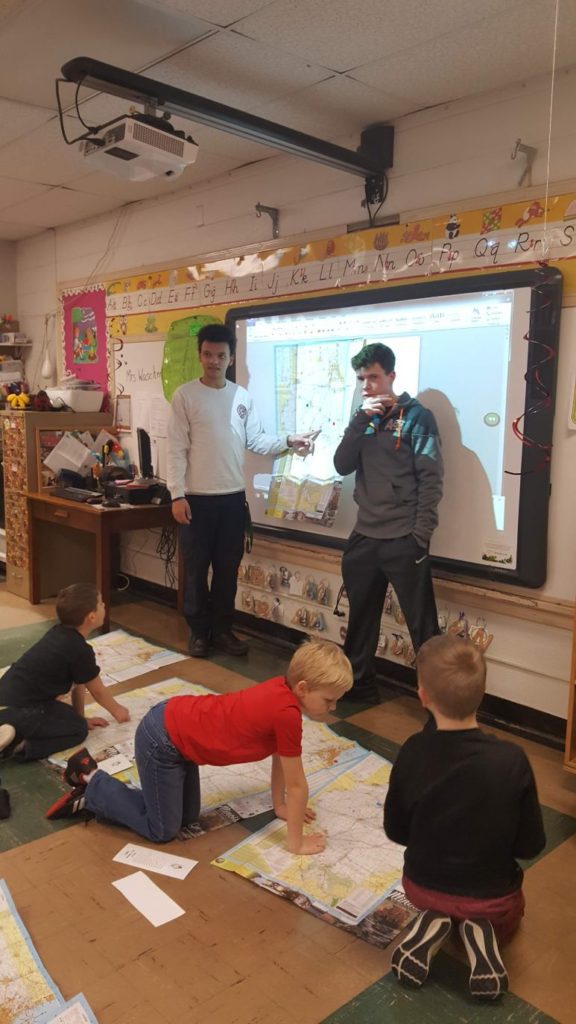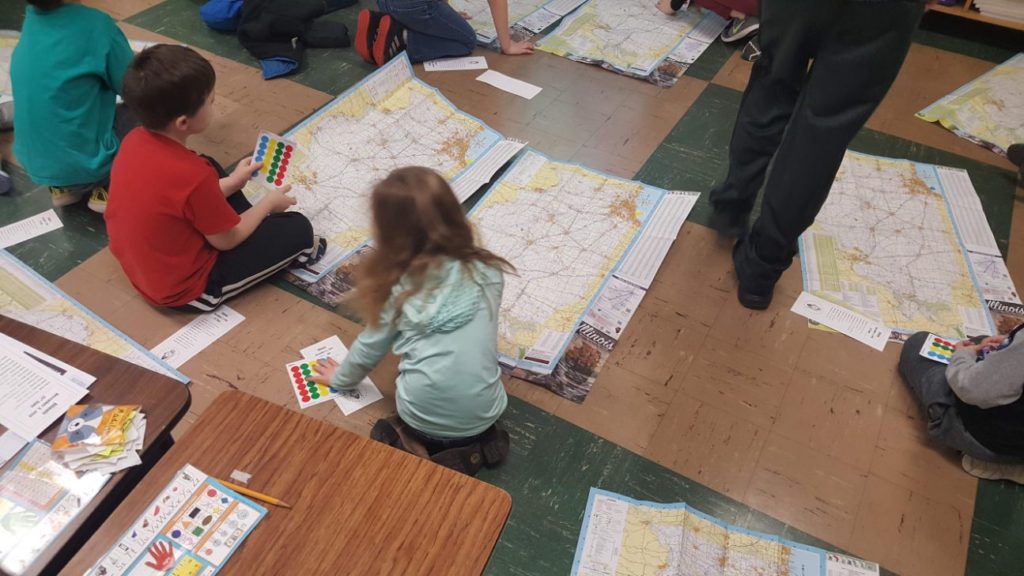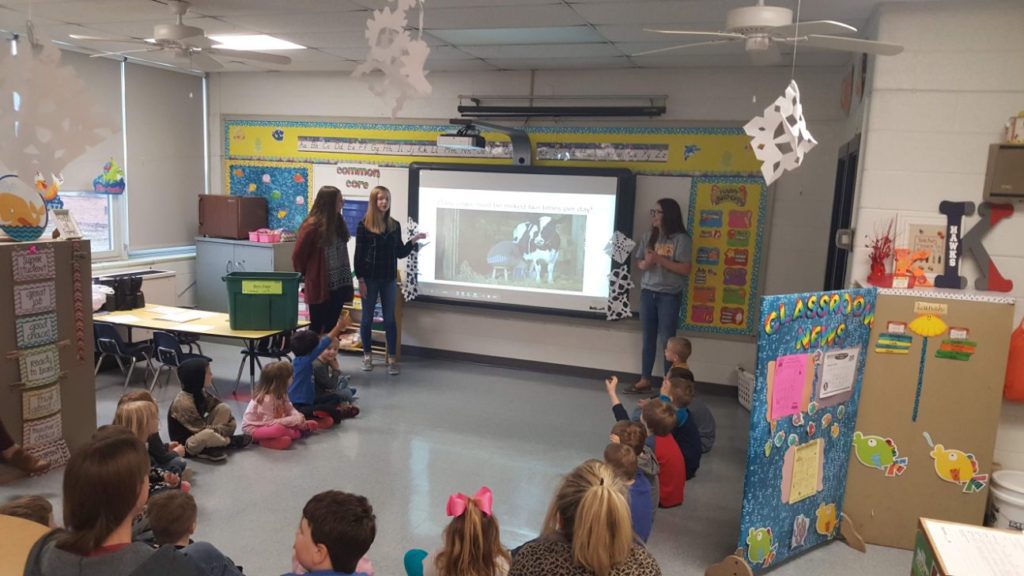In East Central Illinois, farmland is nearly everywhere.
At one time, farmland sustained families and incomes, lifestyles and dreams. And while that is true for some today, the tasks that happen on the land are often unknown, although they impact nearly every aspect of any human’s life.
Since 1993, the Champaign County Farm Bureau has sought to connect students in the classroom to agriculture through the Earth Partners program.
Over time, the project has gone from training teachers to providing materials that they could use to bring agriculture to life within their classrooms.
The Farm Bureau decided to add another layer of resources for teachers in the 2018-2019 school year by giving them access to a certified teacher who helps with everything from curriculum development to presenting lessons in the classroom.
“We’re just trying to grow our impact,” Champaign County Farm Bureau Executive Director Kirk Builta said. “We just want to make sure that every student is grounded in agriculture. Agriculture can play such a big role in STEM. We want to talk about that and how folks can support us.”
Sarah Kaper joined the Champaign County Farm Bureau team in August as she left her role as a second-grade teacher.
“Sarah has immediate credibility with teachers and administrators,” Builta said. “It puts a professional face on our education system and what we can provide.”
Throughout the school year, Kaper has visited or worked with every school in Champaign County: including Prairieview-Ogden, St. Joseph Elementary/Middle School and St. Joseph-Ogden High School as well as throughout the Heritage School District.
Immediately, small students bring the words agriculture and farmer together.
“I had a little boy tell me, ‘You don’t look like a farm and you don’t smell like a farmer,’ ” Kaper said.
Kaper usually starts with helping students understand what the word agriculture means.
“Some kids think it’s a different culture, some kids know that there is a type of farming, but they don’t know how; they think of sows, cows and plows.
“But what they don’t think of is the food that they eat, the fibers in the clothing that they wear or the fuel that they put in the cars that they are in.”
Agriculture education goes beyond something that’s out there to something that is vital to every human’s existence.
Kaper asks the students, “Have you eaten in the last 24 hours? Are you wearing clothes today? Did you get to school on a bus or in a car?
“Then immediately we have connection,” she continued. “Then agriculture isn’t this big scary word or even a word that we guess at, it then has some connection in their own minds.”
Sometimes the only connection a child needs is a Tootsie Roll or a pizza.
Second-grade students at Prairiview-Ogden North became very involved when the topic of discussion was the small chocolate candy.
“(Kaper) presented a lesson about Tootsie Rolls and how they are made,” PVO second-grade teacher Kathy Izard said.
“It included all the ingredients and where they come from, both ones from Illinois and around the world. It actually fit in well with a unit we were doing on biographies and inventions as she explored the history of the candy. She also incorporated math as we learned how many are made each minute in the factory.
“The students loved the lesson. They were very involved and didn’t even realize all the subject areas she presented in such a short time. They especially loved the candy sample!”
Kaper then presented a pizza unit to first-grade students at PVO North.
Their teacher, Laura Kelly, said that the students were very engaged when their guest presenter arrived.
“She did a pizza unit, and explained all the parts of the pizza, and where they came from on the farm,” Kelly said. “They got to make a pizza out of paper as she taught about each part.”
Even though many of the students in the class are “farm kids,” Kelly said they seemed to learn things they didn’t already know.
In order to bridge state requirements for each grade level, Kaper talks about Illinois crops and renewable resources to fourth-graders. Students learn about Illinois history by talking about crops that are produced around the state and the effects they have on the Illinois economy.
Then, as they get into junior high, Kaper talks about careers in the field of agriculture as students begin to think about courses that will put them on a professional path in high school.
“The thought is that that’s just a farmer,” Kaper said. “But kids don’t realize, and what we don’t realize as adults, is we need (ag professionals) in every facet of our world: accountants, marketing specialists, scientists.”
“It’s more than seed corn and feeding the animals,” she continued. “We use the corn in a lot of different ways. We can use this in a way that we can fuel cars and buses.”
Kaper challenges the students to think about, “what else can we do with this?”
“It took someone very smart to figure that out,” she said.
As students get into high school, she enlists their help to teach the younger students, at times.
Heritage High School FFA is working hard to use their teenagers to engage the younger students in ag education. Kaper was impressed with the program and enjoyed seeing students take the initiative to prepare lessons that resonated with the young students.
Students aren’t the only ones learning a thing or two about agriculture, though.
The difference between dirt and soil was explained to Kaper by a local farmer.
“It’s not dirt, it’s soil,” she said. “Dirt is something that you play in, soil is something you plant in. And I am forever corrected on that one.”
The Farm Bureau’s reasoning behind bringing on a licensed teacher wasn’t solely so that he or she could lead classroom discussions, however.
“It’s about connecting with kids and giving them knowledge,” Kaper said. “I’ve never lost my passion for doing that. It’s important that every kid is impacted. That’s my favorite part.”
Connecting with teachers in the same way is also something Kaper is passionate about.
“There’s a real connection (with teachers) when I come into the classroom because I know where they are, I know what they are trying to do, I know what the teachers need, usually: sometimes its a break and sometimes it’s a supplement to what they just taught. And I’m always happy to do that. They are in the trenches. It’s a hard job. I know that well.”
Through the agriculture education, the Farm Bureau hopes that students will not only learn about what is produced through agriculture, but also that they will become educated consumers as they enter adulthood.
“It’s giving them the knowledge to become great adults with everything that they need to make good decisions about what they put in their body or on their body,” Kaper said.
There are times when Kaper talks to students about farms, particularly locally-owned farms and farmers, and how they care for their land and animals. She also teaches them about reading package labels.
“(Farmers) are a wealth of knowledge,” Kaper said. “They know about their animals.
We’re in a great community where we have the University of Illinois that allows those farmers to access knowledge about the health of their animals. It’s great to go in and tell kids about that because they don’t always know.”
Bulita said that the Champaign County Farm Bureau is looking at ways to expand and enhance the Earth Partners program under the feedback and experiences of Kaper.
The Farm Bureau has toured Champaign County with local coffee shop get-togethers throughout the year, and are looking for donations to help fund the Earth Partners program.
To donate to Earth Partners, text grounded to 56651 or visit https://ccfbfoundation.com/donate/.








